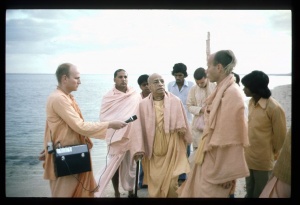SB 11.21.15: Difference between revisions
m (1 revision(s)) |
No edit summary |
||
| Line 1: | Line 1: | ||
{{info | {{info | ||
|speaker=Lord | |speaker=Lord Kṛṣṇa the Supreme Personality of Godhead | ||
|listener=Uddhava | |listener=Uddhava | ||
}} | }} | ||
[[Category:Srimad-Bhagavatam - Canto 11 Chapter 21]] | |||
[[Category:Bhagavatam Verses Spoken by Lord Krsna - Vanisource|112115]] | |||
<div style="float:left">'''[[Srimad-Bhagavatam]] - [[SB 11|Eleventh Canto]] - [[SB 11.21: Lord Krsna's Explanation of the Vedic Path|Chapter 21: Lord Kṛṣṇa's Explanation of the Vedic Path]]'''</div> | |||
<div style="float:right">[[File:Go-previous.png|link=SB 11.21.14]] '''[[SB 11.21.14]] - [[SB 11.21.16]]''' [[File:Go-next.png|link=SB 11.21.16]]</div> | |||
{{RandomImage}} | |||
{{SBnotice}} | |||
==== TEXT 15 ==== | ==== TEXT 15 ==== | ||
<div | <div class="verse"> | ||
mantrasya ca parijñānaṁ | :mantrasya ca parijñānaṁ | ||
karma-śuddhir mad-arpaṇam | :karma-śuddhir mad-arpaṇam | ||
dharmaḥ sampadyate ṣaḍbhir | :dharmaḥ sampadyate ṣaḍbhir | ||
adharmas tu viparyayaḥ | :adharmas tu viparyayaḥ | ||
</div> | </div> | ||
| Line 17: | Line 22: | ||
==== SYNONYMS ==== | ==== SYNONYMS ==== | ||
<div | <div class="synonyms"> | ||
mantrasya—(the purification) of a mantra; ca—and; parijñānam—correct knowledge; karma—of work; śuddhiḥ—the purification; mat-arpaṇam—offering unto Me; dharmaḥ—religiousness; sampadyate—is achieved; ṣaḍbhiḥ—by the six (purification of place, time, substance, the doer, the mantras and the work); adharmaḥ—irreligiosity; tu—but; viparyayaḥ—otherwise. | mantrasya—(the purification) of a mantra; ca—and; parijñānam—correct knowledge; karma—of work; śuddhiḥ—the purification; mat-arpaṇam—offering unto Me; dharmaḥ—religiousness; sampadyate—is achieved; ṣaḍbhiḥ—by the six (purification of place, time, substance, the doer, the mantras and the work); adharmaḥ—irreligiosity; tu—but; viparyayaḥ—otherwise. | ||
</div> | </div> | ||
{{SBcollapse}} | |||
==== TRANSLATION ==== | ==== TRANSLATION ==== | ||
<div | <div class="translation"> | ||
A mantra is purified when chanted with proper knowledge, and one's work is purified when offered to Me. Thus by purification of the place, time, substance, doer, mantras and work, one becomes religious, and by negligence of these six items one is considered irreligious. | A mantra is purified when chanted with proper knowledge, and one's work is purified when offered to Me. Thus by purification of the place, time, substance, doer, mantras and work, one becomes religious, and by negligence of these six items one is considered irreligious. | ||
</div> | </div> | ||
| Line 31: | Line 36: | ||
==== PURPORT ==== | ==== PURPORT ==== | ||
<div | <div class="purport"> | ||
One receives a mantra from the mouth of a bona fide spiritual master, who instructs the disciple in the method, meaning and ultimate purpose of the mantra. The bona fide spiritual master in this age gives his disciple the mahā-mantra, or holy names of God, Hare Kṛṣṇa, Hare Kṛṣṇa, Kṛṣṇa Kṛṣṇa, Hare Hare/ Hare Rāma, Hare Rāma, Rāma Rāma, Hare Hare. One who chants this mantra, considering himself to be the eternal servant of the Lord, gradually learns to chant offenselessly and by such purified chanting quickly achieves the highest perfection of life. The Lord here summarizes His discussion of purity and impurity, which manifest ultimately in religious and irreligious life. | One receives a ''mantra'' from the mouth of a bona fide spiritual master, who instructs the disciple in the method, meaning and ultimate purpose of the ''mantra''. The bona fide spiritual master in this age gives his disciple the ''mahā-mantra'', or holy names of God, Hare Kṛṣṇa, Hare Kṛṣṇa, Kṛṣṇa Kṛṣṇa, Hare Hare/ Hare Rāma, Hare Rāma, Rāma Rāma, Hare Hare. One who chants this ''mantra'', considering himself to be the eternal servant of the Lord, gradually learns to chant offenselessly and by such purified chanting quickly achieves the highest perfection of life. The Lord here summarizes His discussion of purity and impurity, which manifest ultimately in religious and irreligious life. | ||
</div> | </div> | ||
__NOTOC__ | </div> | ||
</div> | |||
<div style="float:right">[[File:Go-previous.png|link=SB 11.21.14]] '''[[SB 11.21.14]] - [[SB 11.21.16]]''' [[File:Go-next.png|link=SB 11.21.16]]</div> | |||
__NOTOC__ | |||
__NOEDITSECTION__ | |||
Revision as of 18:26, 2 July 2021

A.C. Bhaktivedanta Swami Prabhupada
Please note: The synonyms, translation and purport of this verse were composed by disciples of Śrīla Prabhupāda
TEXT 15
- mantrasya ca parijñānaṁ
- karma-śuddhir mad-arpaṇam
- dharmaḥ sampadyate ṣaḍbhir
- adharmas tu viparyayaḥ
SYNONYMS
mantrasya—(the purification) of a mantra; ca—and; parijñānam—correct knowledge; karma—of work; śuddhiḥ—the purification; mat-arpaṇam—offering unto Me; dharmaḥ—religiousness; sampadyate—is achieved; ṣaḍbhiḥ—by the six (purification of place, time, substance, the doer, the mantras and the work); adharmaḥ—irreligiosity; tu—but; viparyayaḥ—otherwise.
Translation and purport composed by disciples of Śrīla Prabhupāda
TRANSLATION
A mantra is purified when chanted with proper knowledge, and one's work is purified when offered to Me. Thus by purification of the place, time, substance, doer, mantras and work, one becomes religious, and by negligence of these six items one is considered irreligious.
PURPORT
One receives a mantra from the mouth of a bona fide spiritual master, who instructs the disciple in the method, meaning and ultimate purpose of the mantra. The bona fide spiritual master in this age gives his disciple the mahā-mantra, or holy names of God, Hare Kṛṣṇa, Hare Kṛṣṇa, Kṛṣṇa Kṛṣṇa, Hare Hare/ Hare Rāma, Hare Rāma, Rāma Rāma, Hare Hare. One who chants this mantra, considering himself to be the eternal servant of the Lord, gradually learns to chant offenselessly and by such purified chanting quickly achieves the highest perfection of life. The Lord here summarizes His discussion of purity and impurity, which manifest ultimately in religious and irreligious life.